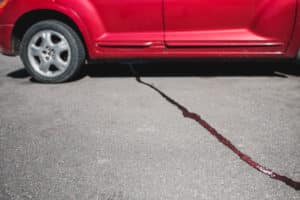People think that oil spills on a driveway are just a cosmetic problem. This is not true. Some oil spills can be quite dangerous to concrete. They can break concrete down over time, meaning that if you leave oil spills on concrete, it can cause the deterioration of your driveway.
Fuel and lubricating oil are only a threat to your concrete if the concrete is new and not yet cured. Then oil can interfere with the concrete’s ability to form strong bonds between the cement and the aggregate.
However, oil is rarely pure. It typically contains contaminants that can damage your concrete. Of chief concern is sulfur. Sulfur is a common contaminant in fuel and lubricating oil, but it also has the potential to damage concrete. Sulfur in fuel oil can change into sulfuric acid through exposure to water. Sulfuric acid attacks concrete, though it is not the most damaging acid for concrete.
It’s worth noting that older oil stains are likely to be worse in this context. That’s because old fuel standards allowed higher levels of sulfur in fuel. Before 2006, the standards for diesel fuel allowed up to 500 parts per million (ppm) of sulfur and up to 300 ppm of sulfur in gasoline. Now modern standards allow only 15-30 ppm of sulfur in these fuels.

In another instance, he described a plant for manufacturing diesel fuel injectors. He noted “extensive” concrete deterioration where the diesel oil had spilled continuously for about 20 years.
Thus, it seems that deterioration of concrete slabs by oil and diesel spills likely takes 20-70 years. This corresponds roughly to the timetable for higher sulfur-containing fuels, so if you have spills that date to the early 2000s, it’s a good idea to try to clean oil stains from your driveway.
In addition to fuel and lubricating oils, food oil spills can actually be even worse for concrete. Some of the common oils considered bad for concrete include:
These oils can cause moderate deterioration of concrete. Spills of these types of cooking oil should be cleaned up as quickly as possible.
In many cases the problem is that bacteria attack the food compounds, and unlike the microbes in an eco-friendly concrete cleaner, they produce acids that then attack the concrete. The concrete then breaks down. It’s not just food oils that lead to this problem, it’s often the result of other spills, such as soda and other foods that might encourage the growth of bacteria.
While most people think that oil spills are only a cosmetic problem for concrete, it turns out that oil spills can actually damage concrete, especially if left for long periods of time. It’s important to fully clean up oil spills to reduce the risk of long-term damage to concrete.
If you are looking for an eco-friendly way to clean concrete, consider Terminator-HSD, a powerful concrete cleaner that contains no dangerous chemicals. It’s completely safe for you, your family, and your watershed. Plus, it’s highly effective.
Buy it on Amazon or contact us about bulk orders.
Remove oil stains from concrete with little effort. An Eco-Friendly solution that naturally dissolves oil stains with no scrubbing or harmful chemicals. Just apply and add a little water.
Buy Now